Date:
Author: Anita Manfreda, Senior Lecturer in Tourism, Torrens University Australia
Original article: https://theconversation.com/an-exotic-escape-or-empty-illusion-how-the-white-lotus-exposes-the-contradictions-of-luxury-travel-253229

The White Lotus season three returns to familiar territory: an exotic escape, privileged and powerful guests, the supposed heights of luxury.
But beneath this lies a satirical critique of these very things – an investigation into the contradictions of luxury travel.
Set in Thailand, the heart of the South Asian wellness scene, the show comments on more than just what luxury looks like. It asks: what does luxury cost? And who bears this cost?
At the same time, the show quietly gestures towards what tourism could become, if we were bold enough to re-imagine it. Because luxury isn’t the problem. The problem is how we do it.
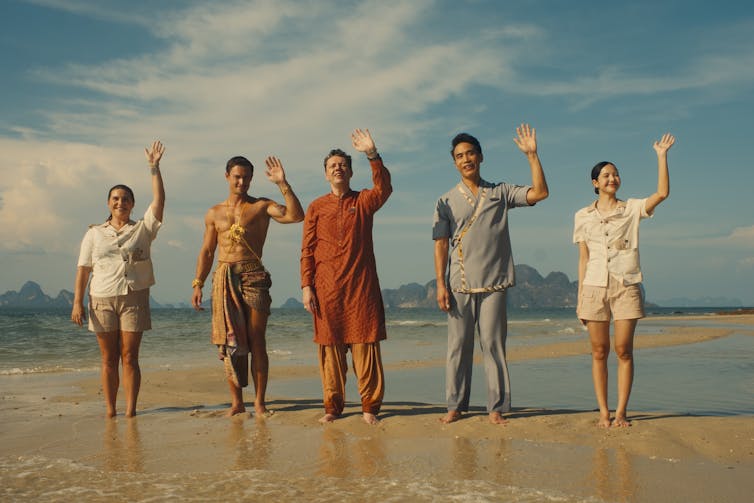
Warner Bros
Wellness … but not really
Season three leans into the booming wellness economy. Between floating therapy, personalised biomarker tests and digital detoxes, the appearance of “healing” is everywhere.
The irony, however, is clear: guests pursue self-care, but act disconnected, irritable and hostile.
The luxury setting reflects their worst impulses. Characters such as Jaclyn (Michelle Monaghan), a Hollywood star chasing relevance, and Victoria (Parker Posey), lost without her Lorazepam, treat wellness practices as a trend that’s more about image than transformation.
This reflects a broader trend in luxury tourism: wellness that photographs well, but rarely goes beneath the surface.
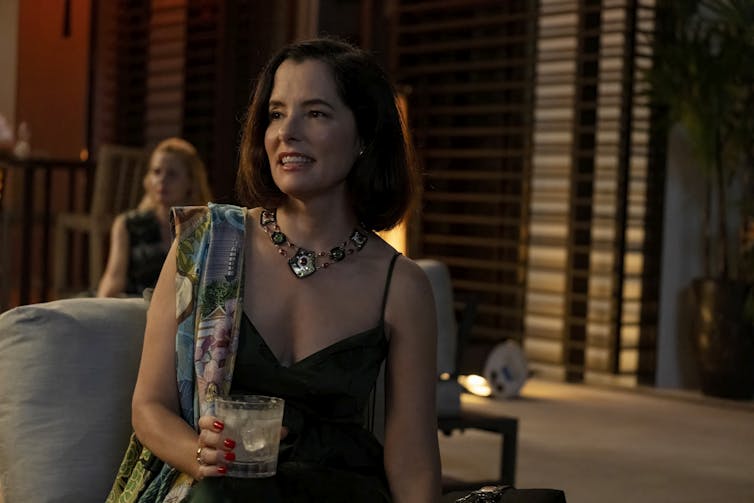
Warner Bros
Research shows real transformation in tourism requires discomfort – something most luxury guests instinctively avoid.
As the character of monk Luang Por Teera (Suthichai Yoon) warns:
Everyone runs from pain toward pleasure […] but you cannot outrun pain.
One person’s wellness is another person’s work
In luxury tourism, wellness is not mutual. One person’s transformation often depends on someone else’s sacrifice. And this exchange is never equal.
While the guests of season three try and look inward, those holding space for them – such as the meditation guide Amrita (Shalini Peiris), or the ever-present security guard Gaitok (Tayme Thapthimthong) – remain relatively voiceless. They quietly manage the chaos, with little room for their own stories to flourish.
Throughout the season, the interactions between guest and staff are built on performance. Staff are praised for their beauty, politeness or spiritual presence, but rarely acknowledged as full people.
Emotional and “aesthetic” labour (looking and acting the part) are silently expected and constantly extracted.
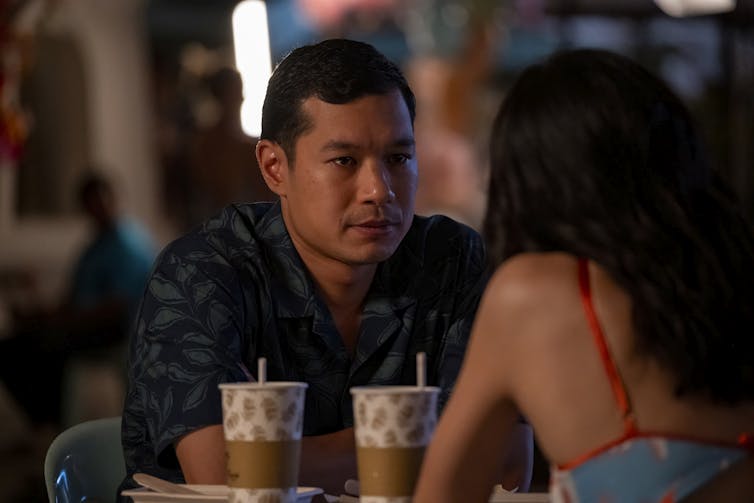
Warner Bros
When resort employee Belinda (Natasha Rothwell) raises concerns about Greg (Jon Gries), resort manager Fabian (Christian Friedel) brushes her off, saying:
It is really not wise to stir anything up. You do not have anything to worry about, as long as you focus on yourself and your job.
The message is clear: stay quiet and stay in your place.
Nature as wallpaper
This season offers no shortage of natural cues. Clean air, ocean views, jungle trails – luxury retreats promise grounding and transformation through nature.
As with much of luxury tourism, however, this nature is curated. The jungle is manicured, the ruins softly lit. Nature, too, performs.
But unlike the staff, who slip into silence and composure, nature doesn’t follow the script. It interrupts, resists and sometimes bites. Monkeys raid the buffet. Lizards slip into rooms and cause havoc. A venomous cobra bites a guest. The pong-pong tree bears deadly fruit.
This is a contradiction luxury travel can’t resolve. Nature is brought in for healing and ambience, but refuses to be compliant.
Culture – flattened and filtered
Season three could have been set in any location with beaches and palm trees. For most guests, the local culture is invisible – a scenic backdrop for their personal drama. Cultural experiences are safely curated, stripped of context, and designed to comfort, not challenge.
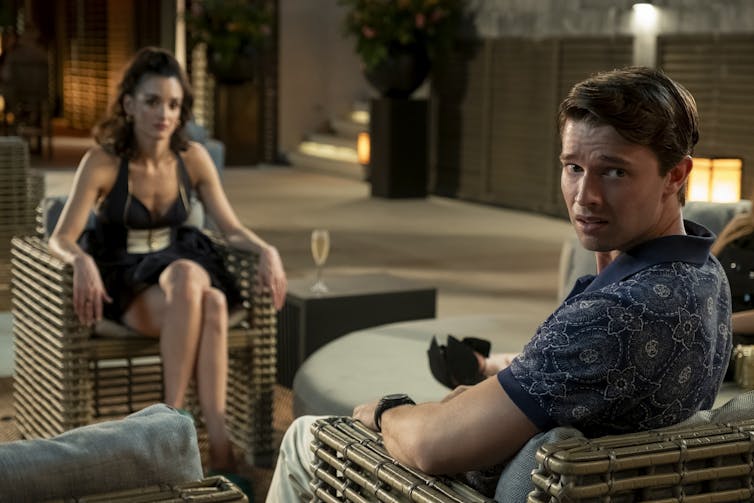
Warner Bros
Even brief moments beyond the resort feel disorienting to the guests.
“He seems like the real deal,” Timothy (Jason Isaacs) says after an encounter with monk Luang Por Teera (Yoon) – revealing how artificial everything else feels.
The show critiques a familiar move in luxury tourism: selling “authenticity” while delivering a flattened, palatable version of reality. There is just enough difference to feel exotic, but never enough to feel uncomfortable.
In one cautionary scene, Jaclyn (Monaghan), Piper (Sarah Catherine Hook), and Laurie (Carrie Coon) wander into a Thai New Year celebration, where locals start chasing them with water guns, drenching them in what feels like joyful protest.
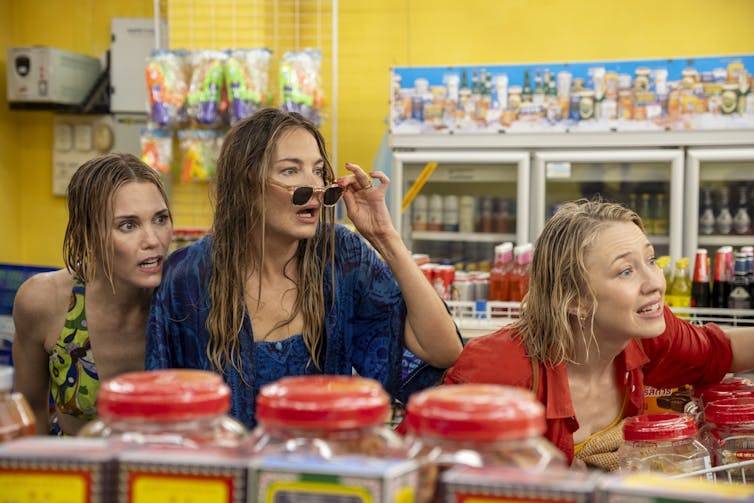
Warner Bros
Although it’s played for laughs, the scene reminds us culture isn’t there to serve. Travellers might do better to meet culture on its terms and not their own.
Glimpses of something better
Ironically, the show’s satire may be fuelling the very thing it critiques. Since season three aired, talk of a “White Lotus effect” has already begun, with claims of a rise in tourism interest and bookings. It seems the (not-so) fantasy still sells, even when we can see the cracks.
Yet, in quiet, awkward and sometimes funny moments, the show resists cynicism, offering glimpses of potential. Guests perceive themselves. Relationships shift. Silenced actors push back.
Through these cracks, we can sense what luxury could be if it connected us, instead of shielding us, from new people and places.
Luxury travel, re-imagined, could be a space where care flows in both directions – where staff are seen as people, and where nature and culture aren’t curated, but respected as they are. Indeed, it is the experiences that expand us, rather than insulate us, which end up changing us the most.
And it’s not just up to hotels and resorts to deliver this shift. It asks something of us, too. A different mindset.
This season’s power lies in what it leaves unsaid, inviting us to examine what is lost in the pursuit of comfort.
![]()
The authors do not work for, consult, own shares in or receive funding from any company or organisation that would benefit from this article, and have disclosed no relevant affiliations beyond their academic appointment.
